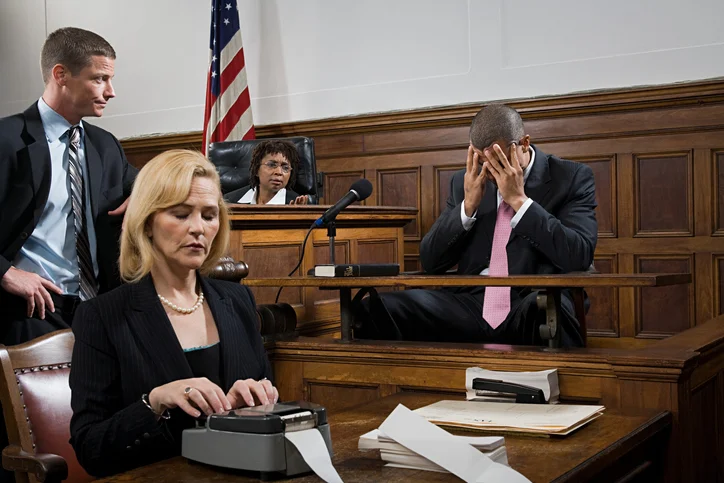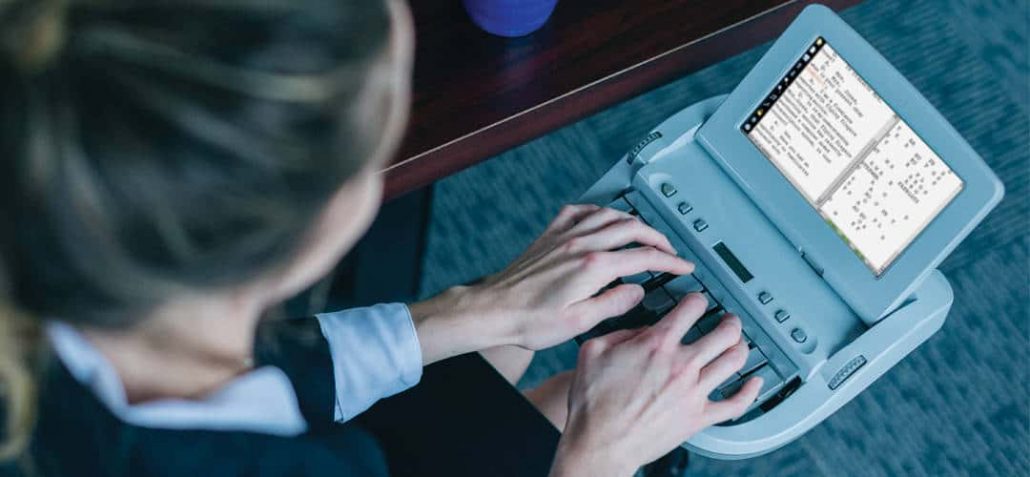Recognizing the Significance of Court Reporting in Legal Services and Process
Court reporting plays a critical function in the legal landscape, acting as the foundation of accurate documents in various lawful process. By offering verbatim records, court press reporters guarantee that every testament and debate is thoroughly captured, therefore securing the stability of the judicial process. Beyond simple paperwork, their job supports fairness and openness, which are fundamental principles of justice. The advancement of innovation and the honest ramifications bordering this occupation increase crucial questions concerning its future. What might these adjustments mean for the legal system and its stakeholders?
Duty of Court Reporters

In addition to transcription, stenotype reporter are typically charged with managing and preserving the circulation of proceedings. They need to be skilled in lawful terms and have a detailed understanding of court room procedures to ensure that the record mirrors the context and subtleties of the discussion. Their job might additionally extend beyond standard court rooms, incorporating administrative hearings, settlements, and other legal settings where documents is vital.
In addition, stenotype reporter may supply real-time reporting, allowing prompt access to records during procedures, which can be vital for the effective management of justice. By making certain that a precise record is kept, stenotype reporter promote the integrity of the lawful procedure, facilitating allures and serving as a vital source for lawyers in their search of justice.
Value of Accuracy

The function of precision expands beyond plain transcription; it incorporates the capability to catch the subtleties of speech, consisting of tone, emphasis, and non-verbal cues, which can be crucial in understanding the context of declarations made. An accurate document makes sure that all celebrations involved-- courts, attorneys, and courts-- have accessibility to the exact same details, fostering fairness and openness in the judicial procedure.
Additionally, accurate records are essential for the appellate procedure, where higher courts rely upon them to examine lower court choices. Mistakes can jeopardize the outcome of an allure, possibly influencing an event's rights and flexibilities. Thus, the dedication to precision in court reporting is not simply an expert commitment yet a foundation of justice that upholds the policy of legislation.
Kinds of Legal Process
Covering a broad variety of legal contexts, stenotype reporter are essential in various kinds of legal procedures, each needing unique approaches and skills. Amongst one of the most common types are civil lawsuits, criminal trials, and management hearings. In civil lawsuits, court press reporters capture depositions, movements, and testaments, guaranteeing that every detail is recorded properly for possible charms or negotiations.
In criminal tests, the duty of stenotype reporter becomes a lot more crucial, as they transcribe all elements of the process, consisting of jury selections, witness testaments, and punishing stages - Court Reporting. The precision and immediacy of these documents are paramount, given the prospective repercussions for offenders and the honesty of the judicial system
Administrative hearings, often conducted by governmental agencies, likewise count on court reporters to keep official records of process. These hearings can entail disagreements concerning regulative conformity, employment issues, or expert licensing, demanding specific paperwork.
Additionally, specialized procedures such as settlement and mediation call for stenotype reporter to record the nuances of arrangements and arrangements. Each sort of legal action provides special difficulties, underscoring click this link the relevance of experienced court reporters in supporting the honesty of the legal process.
Innovation in Court Coverage
Advancements in innovation have reinvented the area of court coverage, boosting both effectiveness and accuracy in the transcription process. Standard methods of hands-on note-taking have been supplemented and, in some situations, replaced by innovative electronic tools that enhance operations and enhance accuracy (Court Reporting). Court reporters currently use advanced steno equipments furnished with real-time transcription capabilities, enabling immediate access to a verbatim account of proceedings
In addition, the integration of speech recognition software application has better changed the reporting landscape. This technology makes it possible for the automatic transcription of talked words, considerably minimizing the moment required for producing official records. In addition, cloud-based systems facilitate easy storage and retrieval of records, making certain that attorneys can access crucial papers from my review here anywhere, any time.
Video clip conferencing devices have also emerged as important parts in remote depositions and hearings, assisting court press reporters catch procedures in real-time, despite place. The mix of these technological advancements not just improves the precision of lawful paperwork yet likewise sustains a more flexible and reliable legal process. As the area proceeds to advance, embracing these developments will be important in fulfilling the growing needs of the legal sector.
Ethical Factors To Consider in Coverage
The assimilation of innovation in court reporting brings with it a set of moral considerations that specialists need to navigate meticulously. As court press reporters significantly use digital tools, problems surrounding discretion, honesty, and accuracy pertain to the leading edge. Shielding delicate information is vital; press reporters should make certain that any kind of digital records are firmly saved and shared only with accredited individuals.
Moreover, the precision of transcriptions is vital. Using software program for real-time coverage does not absolve stenotype reporter from the responsibility of guaranteeing that the last product is specific. Moral responsibilities determine that any type of mistakes need to be quickly fixed and connected to appropriate parties.

Lastly, compliance with lawful criteria and sector regulations is essential. Court press reporters must remain notified about developing honest standards to support the depend on positioned in them by the lawful system. By dealing with these moral factors to consider, find this stenotype reporter can proceed to offer indispensable services in legal proceedings while maintaining public self-confidence.
Final Thought
In conclusion, court reporting plays a vital duty in the lawful system by ensuring exact and trustworthy documents of judicial procedures. The precise work of court reporters promotes the honesty of the legal process and sustains the civil liberties of individuals involved. The combination of modern technology boosts efficiency while keeping honest requirements. Ultimately, the importance of court coverage can not be overstated, as it works as an essential structure for fairness, transparency, and the efficient management of justice.
Court reporting plays a crucial duty in the lawful landscape, serving as the backbone of precise documentation in various lawful procedures.Court reporters regularly play a vital duty in the judicial procedure by creating precise, verbatim records of lawful procedures.In addition, exact transcripts are important for the appellate process, where higher courts count on them to evaluate reduced court choices.Covering a broad array of lawful contexts, court press reporters are necessary in numerous kinds of legal procedures, each calling for unique methods and abilities. By dealing with these honest factors to consider, court press reporters can continue to provide indispensable services in legal proceedings while maintaining public confidence.